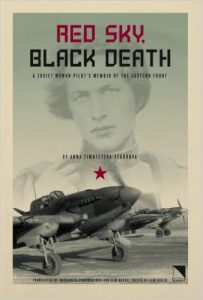Translated by Margarita Ponomariova and Kim Green
Although she flew ground attack planes rather than fighters, Anna Timofeyeva-Yegorova’s story stands as a good reading companion to the life of my character, Aelita Makarova. As I gear up for the release of Aelita’s War, I thought it would be a good time to re-post, from my old blog, this review of an excellent military memoir.
As a source of stories and ideas, is there anything that can compare to World War II? Its scale and impact was so monumental, it seems every type of conflict, every moral dimension and every literary archetype can be drawn from the real life experiences of the war. Its scope affected people from all walks of life and all corners of the world. For a time period that has been covered as extensively as it has been by our popular culture over the past seven decades, there still seem to be limitless supplies of new and compelling stories to be mined from its depths.
The most recent example I’ve encountered is also one of the best military memoirs I can recall reading. Red Sky, Black Death is the story of Anna Yegorova, a ground attack pilot who fought for the Soviet Union during World War II. The book traces her youth, from her time as a proud communist worker building the Moscow underground, to becoming one of the world’s only female attack plane pilots.
The Il-2 “sturmovik” was known as the “flying tank” to Red Army soldiers. To the Germans who felt the wrath of its impressive array of machineguns, cannons, rockets and bombs, it was known as the “black death.” It was a deadly machine for its crew as well. Flying low to the ground, it was vulnerable to both anti-aircraft fire from below and fighter planes from above.
In Yegorova’s account, vivid descriptions of harrowing missions mesh seamlessly with candid accounts of life on base. The narrative continues into peacetime with her struggle against the shameful stigma placed by Stalin’s policies on her as a former prisoner of war. Recognition finally comes twenty years later with a Hero of the Soviet Union award, her nation’s highest honour.
The Soviet Union was the only country to officially recruit women for combat duty during the war. Even having read numerous first hand accounts and non-fiction books on the subject of Soviet women combat pilots, Yegorova’s story still surprised and enthralled me in equal parts.
First and foremost, what stands out is the quality of writing and translating. Yegorova’s experiences are interesting enough on their own. However, given the length of time that has passed, it could easily devolve into either un-linked snippets of memories or a grocery list of events. It is neither of these things. The book is a story and it holds together a clear sense of events as they happened, sometimes sprinkling with intimations of the future and how the recollections linger in the present. The narrative momentum never falters.
Further making her telling stand out is her unusual openness about the contradictions in Soviet life at the time. Many similar memoirs suffer from excessive influence from Soviet era propaganda that the authors experienced, or simply gloss over the political realities. But having bitterly confronted her own brother’s persecution during one of Stalin’s purges as well as her own after the war, Yegorova gives us a fully formed notion of the cruel ironies of risking and sacrificing so much for a country she loves that is ruled by such a repressive system.
What would serve to improve the book would be an appendix, which could clarify the progression of time and place during the narrative (a bare bones timeline is offered as a preface.) While an appendix could offer greater context about the often overlooked air war in the East, this is ultimately a personal record.
Red Sky, Black Death stands with the best military memoirs from the war. I am very happy that this book has found an English translation. It sheds light on several little known (in the Western world at least) corners of the World War II canon. It also has value as a rarity, not only as a memoir of the Soviet experience, but also of a woman in combat.
My rating: ★★★★½